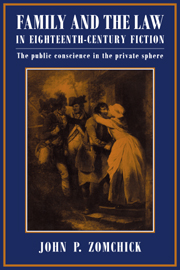Book contents
- Frontmatter
- Contents
- Preface
- Acknowledgments
- 1 Introduction
- 2 Roxana's contractual affiliations
- 3 Clarissa Harlowe: caught in the contract
- 4 Tame spirits, brave fellows, and the web of law: Robert Lovelace's legalistic conscience
- 5 Roderick Random: suited by the law
- 6 Shadows of the prison house or shade of the family tree: Amelia's public and private worlds
- 7 The embattled middle: longing for authority in The Vicar of Wakefield
- 8 Caleb Williams: negating the romance of the public conscience
- Bibliography
- Index
3 - Clarissa Harlowe: caught in the contract
Published online by Cambridge University Press: 10 February 2010
- Frontmatter
- Contents
- Preface
- Acknowledgments
- 1 Introduction
- 2 Roxana's contractual affiliations
- 3 Clarissa Harlowe: caught in the contract
- 4 Tame spirits, brave fellows, and the web of law: Robert Lovelace's legalistic conscience
- 5 Roderick Random: suited by the law
- 6 Shadows of the prison house or shade of the family tree: Amelia's public and private worlds
- 7 The embattled middle: longing for authority in The Vicar of Wakefield
- 8 Caleb Williams: negating the romance of the public conscience
- Bibliography
- Index
Summary
The religious reflex of the real world can, in any case, only then finally vanish, when the practical relations of every-day life offer to man none but perfectly intelligible and reasonable relations with regard to his fellow men and to Nature.
Marx, Capital 1:79Introduction
In Daniel Defoe's Roxana filiative relations represent the greatest threat to the subject's desire for the unconditional freedom to strike the most advantageous bargains regardless of others' needs. Freedom and family are also at the heart of Samuel Richardson's Clarissa, as a juridical discourse of rights, economic imperatives of accumulation, and patriarchal pieties fall into conflict. In both Defoe's and Richardson's novels the contract and its underlying rationale play a crucial role in the heroines' fortunes. Roxana avidly exploits the contract. Clarissa is forced to consider it as protection against other contracting agents. In both instances the interaction of family entanglements and contractual freedom produces the narratives' subjects. In Clarissa, however, the narrative seeks to produce a subject of rights still allied to traditional values and immune from the consequences of accumulation. But as this tragic novel discovers the present impossibility of creating “reasonable relations,” it reverts for consolation to a “perfectly intelligible” – if solipsistic – “religious reflex,” represented as a lover's dying embrace of absolute and imperturbable fidelity.
In this first of two chapters on Richardson's novel, I will examine the heroine's reconstitution as a juridical subject, effected by her grandfather's bequest; her family's reaction to her new “character,” which displaces her from the affective position that she had previously occupied; and Clarissa's response to these events.
- Type
- Chapter
- Information
- Family and the Law in Eighteenth-Century FictionThe Public Conscience in the Private Sphere, pp. 58 - 80Publisher: Cambridge University PressPrint publication year: 1993

